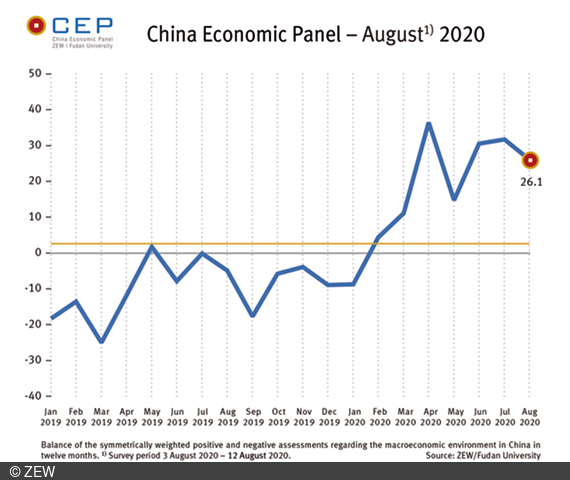Expectations for Chinese Economy Decline Slightly
China Economic PanelCEP indicator declines to 26.1 points
In the August survey (3–12 August 2020), the CEP indicator fell by 5.6 points to a new level of 26.1 points. The CEP indicator, based on the China Economic Panel (CEP) in cooperation with Fudan University, Shanghai, reflects the economic expectations of international financial market experts for China on a 12-month basis. “The CEP indicator is still quite high, however, and remains well above its historical average of 2.6 points,” says Dr. Michael Schröder, senior researcher in the “International Finance and Financial Management” Research Department at ZEW Mannheim and project leader of the CEP survey.
Yet, the positive growth expectations contrast with a considerably worse assessment of the economic situation compared to the previous month. The corresponding indicator fell by 19.2 points to a current reading of minus 29.2 points. “The experts see the Chinese economy as being in much better shape than that of the eurozone and the USA. Nevertheless, the majority (58.3 per cent) considers the situation of the Chinese economy to be poor,” says Michael Schröder, summarising the results of the survey.
GDP growth back to normal not before 2021
Many observers were surprised by the 3.2 per cent growth in real gross domestic product (GDP) announced for the second quarter compared with the same quarter of the previous year. In the meantime, the experts have adjusted their growth forecasts for 2020 accordingly. For the third and fourth quarter of 2020, they expect GDP growth of 3.1 per cent and 3.6 per cent, respectively, and for the whole of 2020, they forecast a growth rate of 2.1 per cent. Although this figure is significantly higher than in the July survey, which predicted 0.8 per cent for 2020, this would still be a very poor result for the Chinese economy. With GDP growth of 4.3 per cent, a return to more normal levels is expected for 2021.
However, more and more of the panel participants believe that this growth is primarily being driven by government economic policy measures. Almost all respondents (around 95 per cent) assume that government consumption will rise in the coming 12 months, and around 90 per cent expect domestic government debt to increase. Despite the massive government support measures, the experts continue to see a decline in the employment rate (the corresponding indicator currently stands at minus 23.8 points). “The adverse effects of the coronavirus crisis on the Chinese economy will continue to be felt for some time to come,” says Michael Schröder.
